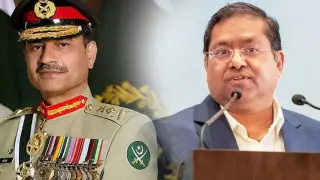
WikiLeaks founder Julian Assange (X/WikiLeaks)
In a poignant statement following his testimony before the Council of Europe, Julian Assange reflected on the challenges of transparency and accountability in an increasingly secretive world. "As I emerge from the dungeon of Belmarsh, the truth now seems less discernible, and I regret how much ground has been lost during that time period," he stated. He expressed concern over the undermining of truth, saying, "I see more impunity, more secrecy, more retaliation for telling the truth, and more self-censorship."
Assange also highlighted serious breaches of privacy and legal boundaries, revealing that the UK government admitted to unlawfully spying on his UK lawyers during proceedings at the European Court of Human Rights. He recounted the alarming targeting of his family, stating, "A CIA asset was permanently assigned to track my wife, and instructions were given to obtain DNA from my six-month-old son’s nappy." Such revelations underscore the extent of surveillance and intimidation faced by those associated with him.
"My wife and infant son were also targeted. A CIA asset was permanently assigned to track my wife and instructions were given to obtain DNA from my six month old son’s nappy" - Julian Assange, Council of Europe
— WikiLeaks (@wikileaks) October 1, 2024
He further detailed the aggressive tactics employed by the US government against him and his colleagues, saying, "The US government launched an investigation against me and my colleagues. It illicitly sent planes of agents to Iceland, paid bribes to an informer to steal our legal and journalistic work product, and without formal process pressured banks and financial services to block our subscriptions and freeze our accounts." These claims emphasize the systemic challenges faced by whistleblowers and journalists advocating for transparency.
"The US government… launched an investigation against me and my colleagues. It illicitly sent planes of agents to Iceland, paid bribes to an informer to steal our legal and journalistic work product, and without formal process pressured banks and financial services to block our…
— WikiLeaks (@wikileaks) October 1, 2024
Recalling pivotal moments in his journey, Assange reflected on the arrest of PFC Manning, a key whistleblower. "14 years ago, the United States military arrested one of our alleged whistleblowers, PFC Manning, a US intelligence analyst based in Iraq," he noted. He shared his original vision for WikiLeaks, stating, "When I founded WikiLeaks, it was driven by a simple dream: to educate people about how the world works so that, through understanding, we might bring about something better."
"When I founded WikiLeaks, it was driven by a simple dream: to educate people about how the world works so that, through understanding, we might bring about something better" - Julian Assange, Council of Europe pic.twitter.com/exTtKx5v0c
— WikiLeaks (@wikileaks) October 1, 2024
In a powerful conclusion, Assange clarified the nature of his current situation. "I want to be totally clear. I am not free today because the system worked. I am free today because, after years of incarceration, I pleaded guilty to journalism. I pleaded guilty to seeking information from a source." This admission highlights the profound sacrifices he has made in pursuit of truth and accountability.
Assange's address to the Council of Europe underscores the broader implications of his case for press freedom and human rights. As the debate continues regarding the treatment of political prisoners and the safeguarding of journalistic integrity, his testimony serves as a clarion call for transparency and justice in an era of increasing governmental secrecy.
"I want to be totally clear. I am not free today because the system worked. I am free today because after years of incarceration I pleaded guilty to journalism. I pleaded guilty to seeking information from a source" - Julian Assange, Council of Europe pic.twitter.com/N0Ix58CeSu
— WikiLeaks (@wikileaks) October 1, 2024













Copyright © 2025 Top Indian News
